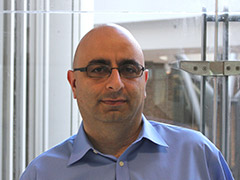CV: Dr. Alain Dabdoub
Dr. Alain Dabdoub, a scientist in Biological Sciences and the Brain Sciences Research Program at SRI, sits down to answer a few questions from Alisa Kim.
Bio basics: A scientist in Biological Sciences and the Brain Sciences Research Program at Sunnybrook Research Institute (SRI) and assistant professor at the University of Toronto. Born and raised in Bethlehem, Palestine. Did his PhD at the University of Maryland and his postdoctoral fellowship at the National Institute on Deafness and Other Communication Disorders at the National Institutes of Health. Married to Becky with two children, aged six and eight years.
How did you become interested in hearing research?
I was always interested in sensory biology and did my PhD on vision, doing mainly biophysics. When I did my postdoc, I wanted to expand into other senses. At the time, and still today, the hearing field was small, with lots of work to be done, as hearing impairment affects many people. I thought that was an important area to go into.
What drew you to SRI?
Before coming to SRI, I was faculty at the University of California-San Diego. The opportunity opened up here, and I came and visited and was really interested. The idea of putting scientists and clinicians together seemed very appealing, and while the drive for innovation and translation is high here, there is also a clear understanding that the fuel for all of this is discovery-driven, fundamental research.
What are you studying now?
We're studying the development of the hearing system in mammals. We focus on two cell types in the inner ear: sensory hair cells, which respond to sound, and auditory neurons, which pick up that sound translation from hair cells and send it to the brain. Like other neurons, both of these cell types, once they die or get damaged, they are not replaced. We're studying how these cells form during development to give us strategies and ideas for regeneration.
How might this work translate into treatments for hearing loss?
Right now there are no biological solutions for hearing loss. The current therapies are limited to hearing aids or cochlear implants. Neither of these works very well, so what we're striving to do is discover new biological solutions rather than depend on these devices. Some of the research we're doing focuses on the genetic pathways responsible for the development of hair cells. We are also working on strategies to stimulate the regeneration of auditory neurons.
How do you find living in Toronto?
We've been so busy setting up the lab, and my wife is also faculty at U of T, and we have two kids. We're barely managing [laughs]. Our kids question our wisdom. They're used to perfect weather almost every day. We had a hard time convincing them to wear a coat because they haven't worn a coat in their lives. But they're embracing it. Tobogganing helped.



